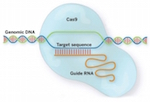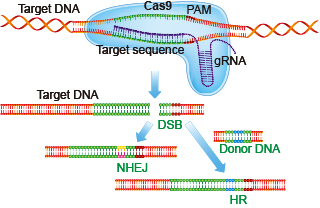HIV Beats CRISPR in First Round, HIV 1 | CRISPR 0

Scientists have come to the surprising realization of HIV’s immense ability to evolve resistance to drugs and now even gene editing using CRISPR.
Researchers at McGill University in Montreal have found out that HIV has the ability to disable efforts to cripple it using CRISPR gene-editing technology. HIV complements the CRISPR attack by introducing mutations at a rapid rate ensuring survival and protection against future attacks. The introduced mutations disable further detection of HIV by the Cas9 endonuclease.
Ever since the discovery of CRISPR, researchers have been attempting to cure untreatable diseases. HIV alone has had more than a dozen papers describing numerous ways it can use to disable the virus. While some papers attempt to edit the genes in the cells that HIV infects, others try to edit HIV gene directly. The current finding successfully proves that the new finding is more or less useless against HIV.
Initial tests with gene editing targeting HIV genes in T-Cells showed that CRISPR was successful in disabling HIV production. However, researchers noticed after just two weeks that the some T-Cells continued to produce HIV cells. What’s more alarming is that these T-Cells were not responding to CRISPR anymore, indicating mutation in the area where CRISPR is being targeted.
However, the virus rapidly and consistently escaped from this inhibition. Sequencing of the HIV-1 escape variants revealed nucleotide insertions, deletions, and substitutions around the Cas9/gRNA cleavage site that are typical for DNA repair by the nonhomologous end-joining pathway. We thus demonstrate the potency of CRISPR-Cas9 as an antiviral approach, but any therapeutic strategy should consider the viral escape implications.
The revelation doesn’t come as a surprise, considering that HIV has so far evolved resistance to every known antiviral drug. However, with all the hype around CRISPR and the promises that it held, it has come as a surprise to researchers about the limited use of gene editing in fighting HIV in humans.
However, researchers believe that a multi-gene focused attack on HIV’s essential genes instead of a single gene could prove to be more useful against HIV in T-cells. The alternate method of changing the genetic code of T-cells where HIV inserts its own genome has shown more promise in decapacitating the viral genes in making their copies.
Researchers behind the study remain hopeful of CRISPR’s potential and other gene editing technologies such as zinc-finger nucleases.
Ref: "CRISPR-Cas9 Can Inhibit HIV-1 Replication but NHEJ Repair Facilitates Virus Escape" , , & Mol. Ther. 24, 522–526 (2016). LINK

